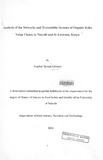Analysis of the Networks and Traceability Systems of Organic Kales Value Chains in Nairobi and its Environs, Kenya
Abstract
Some product information asymmetry is always present in food value chains; when the
asymmetry is high, it increases food safety markets imperfection, reduces trust among
stakeholdersand could compromise food safety and quality. This study assessed information
asymmetry through evaluation of the network structure and traceability strategies in the
organickales value chains around Nairobi. A survey of organic farmers and marketing outlets
in Nairobiwas conducted. Purposive sampling technique, based on organic food certification,
was used and the data collected using semi-structured questionnaires during the interviews.
The network data was analysed using Ucinet Version 6 while traceability data was analysed
using SPSS version 17. From the analysis, there is a moderately high network centralization
of approximately 61 percent although betweenness centrality is very low at approximately 6
percent. The stakeholders had functional traceability systems with most stakeholders using
production, purchases and sales records to trace. Approximately 62 percent of all
stakeholders had chain traceability; collective action and group activities existed that also
enhanced traceability among stakeholders. The stakeholders in the certified organic products
sector had internal monitoring and verification of the members' activities and relied on trust
for information flow. Based on the findings, the study recommends reorganization of
stakeholdersto strengthen the networking structures to increase information flow. In addition,
factors which influence traceability such as monitoring, training, documentation and
certification and the subjective measures such as personnel perception on traceability should
be improved to boost safety and quality of organic products.
Local Identifier
Msc (thesis)Publisher
Department of Food Science and Technology

